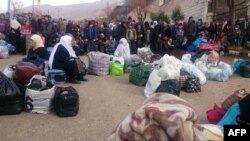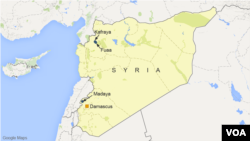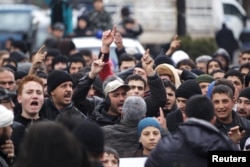The nearly five-year-long Syrian war has been one of the most violent conflicts of modern times with indiscriminate bombing of civilians, systematic rape, sectarian massacres, beheadings and enslavement. Each day brings a new story, the latest being with supporters of President Bashar al-Assad and Hezbollah, the radical Lebanese Shi'ite militia backing the Syrian regime, openly taunting on social media those starving in the besieged town of Madaya west of the capital, Damascus.
Online social media campaign
The level of sectarian and group hatred involving the various opposing sides in the conflict threatens United Nations-backed peace negotiations that Western diplomats hope will start this month. The online social media campaign ridiculing the starving adds to a sense of foreboding about the talks, which privately U.S. officials say they see as a long shot.
Online supporters of the Assad regime and Hezbollah launched a social media campaign during the past few days to mock starving civilians in Madaya, which has been under siege by the Syrian army and Lebanese Shi'ite fighters since July. They posted photos of spreads of food and skeletons on Twitter (with the hashtag, which means solidarity with the siege of Madaya).
The online campaign started hours after Hezbollah accused anti-Assad militants of precipitating the crisis in Madaya, a mountain village with a pre-war population of 40,000 that has been swollen by refugees from nearby villages, by withholding food from the locals and claiming there are no real victims of hunger in the town.
Madaya under siege
Hezbollah’s Al Manar TV in neighboring Lebanon broadcast a report saying the pictures of the starving in Madaya posted by anti-Assad activists on networking sites are fabrications. Thousands of Hezbollah supporters took to Twitter to deride the claims of starvation in Madaya in response to another hashtag [Madaya starved to death] started by anti-Assad activists.
Some of the tweets even took issue with the claim that Madaya is under siege, saying the photographs of the starving are forgeries. Others, however, appeared to be gloating at the suffering of the locals, prompting the outrage of anti-Assad groups that say it represents a new low in the war.
Five residents died from starvation-related illnesses recently in Madaya as the town waited for promised U.N. aid. One of the dead was a 9-year-old boy, according to Dr. Ammar Ghanem, a Syrian-born doctor living in the United States who is in daily contact with family members in Madaya.
Humanitarian aid
Aid eventually arrived in Madaya Monday - the first delivery of food by U.N. agencies to the town since October. Residents, though, fear future aid may get blocked and the delivery has not stopped international outrage over the ridiculing of the starving in the town.
Melissa Fleming, UNHCR’s spokeswoman, said the aid delivery was planned to unfold in three stages over several days with food parcels delivered first, followed by flour, medicine and blankets.
Ghanem, however, said people in Madaya worry U.N. aid won’t be enough and will just be a one-time delivery.
“That is what happened in October; food was delivered but it wasn’t enough to go around and then the world forgot about the town,” he told VOA.
On the pro-Assad taunting of the dying, he said, “This is the 21st century and we have means of communication. We can see the pictures of emaciated children; we can talk to people there. I don’t see how they can deny what is happening in Madaya and I really don’t understand the strategy of denial.”
The medical charity Doctors Without Borders said Sunday that 10 people in the town are in need of immediate hospitalization. Another 250 will likely become critically ill within a week if food doesn’t get through. It says 28 people have died due to starvation since December 1.
Starvation, weapon of war
International rights group Amnesty International has published accounts of people trying to survive on boiled water and leaves.
In most wars, combatants wield aid as a weapon, circumscribing humanitarian access and impeding assistance to civilians in enemy-held territory, hoping hunger will starve resistance into submission or undermine the morale of foes.
In no war has this been truer than in Syria, where the horror of a prolonged vicious conflict has been compounded by aid and food being held hostage to politics and combat, says Philip Luther, Middle East and North Africa director for Amnesty International. He says Madaya is “the tip of an iceberg.”
"Syrians are suffering and dying across the country because starvation is being used as a weapon of war by both the Syrian government and armed groups.” What Madaya has endured highlights the crucial need to allow unimpeded humanitarian access to all civilians in need and lift all sieges on civilian populations across country, Luther said.













